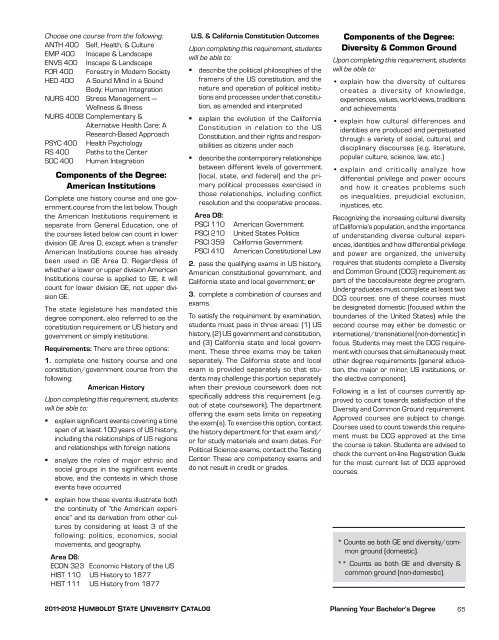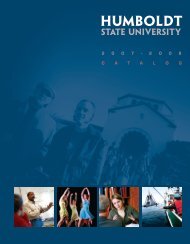2011-12 Academic Year - Bad Request - Humboldt State University
2011-12 Academic Year - Bad Request - Humboldt State University
2011-12 Academic Year - Bad Request - Humboldt State University
Create successful ePaper yourself
Turn your PDF publications into a flip-book with our unique Google optimized e-Paper software.
Choose one course from the following:<br />
ANTH 400 Self, Health, & Culture<br />
EMP 400 Inscape & Landscape<br />
ENVS 400 Inscape & Landscape<br />
FOR 400 Forestry in Modern Society<br />
HED 400 A Sound Mind in a Sound<br />
Body: Human Integration<br />
NURS 400 Stress Management —<br />
Wellness & Illness<br />
NURS 400B Complementary &<br />
Alternative Health Care: A<br />
Research-Based Approach<br />
PSYC 400 Health Psychology<br />
RS 400 Paths to the Center<br />
SOC 400 Human Integration<br />
Components of the Degree:<br />
American Institutions<br />
Complete one history course and one government<br />
course from the list below. Though<br />
the American Institutions requirement is<br />
separate from General Education, one of<br />
the courses listed below can count in lower<br />
division GE Area D, except when a transfer<br />
American Institutions course has already<br />
been used in GE Area D. Regardless of<br />
whether a lower or upper division American<br />
Institutions course is applied to GE, it will<br />
count for lower division GE, not upper division<br />
GE.<br />
The state legislature has mandated this<br />
degree component, also referred to as the<br />
constitution requirement or US history and<br />
government or simply institu tions.<br />
Requirements: There are three options:<br />
1. complete one history course and one<br />
constitution/government course from the<br />
following:<br />
American History<br />
Upon completing this requirement, students<br />
will be able to:<br />
explain significant events covering a time<br />
span of at least 100 years of US history,<br />
including the relationships of US regions<br />
and relationships with foreign nations<br />
analyze the roles of major ethnic and<br />
social groups in the significant events<br />
above, and the contexts in which those<br />
events have occurred<br />
explain how these events illustrate both<br />
the continuity of “the American experience”<br />
and its derivation from other cultures<br />
by considering at least 3 of the<br />
following: politics, economics, social<br />
movements, and geography.<br />
Area D6:<br />
ECON 323 Economic History of the US<br />
HIST 110 US History to 1877<br />
HIST 111 US History from 1877<br />
<strong>2011</strong>-20<strong>12</strong> <strong>Humboldt</strong> <strong>State</strong> <strong>University</strong> Catalog<br />
U.S. & California Constitution Outcomes<br />
Upon completing this requirement, students<br />
will be able to:<br />
describe the political philosophies of the<br />
framers of the US constitution, and the<br />
nature and operation of political institutions<br />
and processes under that constitution,<br />
as amended and interpreted<br />
explain the evolution of the California<br />
Constitution in relation to the US<br />
Constitution, and their rights and responsibilities<br />
as citizens under each<br />
describe the contemporary relationships<br />
between different levels of government<br />
(local, state, and federal) and the primary<br />
political processes exercised in<br />
those relationships, including conflict<br />
resolution and the cooperative process.<br />
Area D8:<br />
PSCI 110 American Government<br />
PSCI 210 United <strong>State</strong>s Politics<br />
PSCI 359 California Government<br />
PSCI 410 American Constitutional Law<br />
2. pass the qualifying exams in US history,<br />
American constitutional government, and<br />
California state and local government; or<br />
3. complete a combination of courses and<br />
exams.<br />
To satisfy the require ment by examination,<br />
students must pass in three areas: (1) US<br />
history, (2) US govern ment and constitution,<br />
and (3) California state and local government.<br />
These three exams may be taken<br />
separately. The California state and local<br />
exam is provided separately so that students<br />
may challenge this portion separately<br />
when their previous coursework does not<br />
specifically address this requirement (e.g.<br />
out of state coursework). The department<br />
offering the exam sets limits on repeating<br />
the exam(s). To exercise this option, contact<br />
the history department for that exam and/<br />
or for study materials and exam dates. For<br />
Political Science exams, contact the Testing<br />
Center. These are competency exams and<br />
do not result in credit or grades.<br />
Components of the Degree:<br />
Diversity & Common Ground<br />
Upon completing this requirement, students<br />
will be able to:<br />
• explain how the diversity of cultures<br />
creates a diversity of knowledge,<br />
experiences, values, world views, traditions<br />
and achievements<br />
• explain how cultural differences and<br />
identities are produced and perpetuated<br />
through a variety of social, cultural, and<br />
disciplinary discourses (e.g. literature,<br />
popular culture, science, law, etc.)<br />
• explain and critically analyze how<br />
differential privilege and power occurs<br />
and how it creates problems such<br />
as inequalities, prejudicial exclusion,<br />
injustices, etc.<br />
Recognizing the increasing cultural diversity<br />
of California’s population, and the importance<br />
of understanding diverse cultural experiences,<br />
identities and how differential privilege<br />
and power are organized, the university<br />
requires that students complete a Diversity<br />
and Common Ground (DCG) requirement as<br />
part of the baccalaureate degree program.<br />
Undergraduates must complete at least two<br />
DCG courses; one of these courses must<br />
be designated domestic (focused within the<br />
boundaries of the United <strong>State</strong>s) while the<br />
second course may either be domestic or<br />
international/transnational (non-domestic) in<br />
focus. Students may meet the DCG requirement<br />
with courses that simultaneously meet<br />
other degree requirements (general education,<br />
the major or minor, US institutions, or<br />
the elective component).<br />
Following is a list of courses currently approved<br />
to count towards satisfaction of the<br />
Diversity and Common Ground requirement.<br />
Approved courses are subject to change.<br />
Courses used to count towards this requirement<br />
must be DCG approved at the time<br />
the course is taken. Students are advised to<br />
check the current on-line Registration Guide<br />
for the most current list of DCG approved<br />
courses.<br />
* Counts as both GE and diversity/common<br />
ground (domestic).<br />
** Counts as both GE and diversity &<br />
common ground (non-domestic).<br />
Planning Your Bachelor’s Degree<br />
65

















